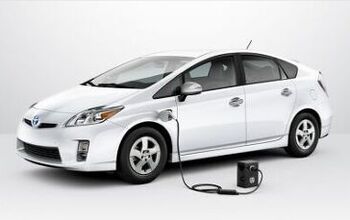Oregon Debates Pay-Per-Mile EV Tax
My home state of Oregon has the unfortunate distinction of pioneering the practice of pay-per– mile taxation, having studied the GPS tracking approach to road taxes in a pilot program back in 2005-2007. Originally, the track-and-tax scheme was envisioned as a replacement for the gas tax, but now it’s being raised as a way of taxing motorists who go without gasoline altogether. The Eugene Register Guard reports
A bill before the Oregon Legislature aims to deal with the government’s potential beefs with a growing fleet of cars and trucks that never stop for fuel at a gas station: that they don’t ever pay the gas tax that helps cover the cost of state and local road construction and maintenance.
Under House Bill 2328, those drivers would pay a “vehicle road usage charge,” starting with model year 2014 electric vehicles and plug-in gas-electric hybrids.
Proponents say the bill will build on lessons learned from the pilot testing, and avoids the legitimate concerns about pay-per-mile which were first raised by the pilot project’s report. But does taxing EVs actually make sense, or is this just the politically-palatable first step towards an Orwellian nightmare of GPS vehicle tracking? Meanwhile, doesn’t the State of Oregon give up to $750 in tax credits for EV purchases? Mixed messages much?
Getting back to the pilot project’s concerns, the first major issue was cost: at 1.2 cents per mile, the pilot program’s pay-per-mile rate often raised driving costs above what would otherwise be paid in gasoline taxes. The Reggie reports
The latest fee would be set at 0.6 cents per gallon. That means an electric car driven 15,000 miles a year in Oregon would cost $90 in fees.
That is on par with what a 48-miles-per-gallon Toyota Prius hybrid costs in state gas taxes (at 29 cents-per-gallon) for the same distance traveled. And it’s half what the driver of a 24-mpg vehicle would pay in gas taxes driving the same distance.
OK, that seems fair-ish. Now what about the whole Orwellian nightmare business? How can government track miles driven without actually tracking everyone’s vehicles? According to JimWhitty, director of the (Orwellian-sounding) Office of Innovative Partnerships for the state Department of Transportation
The bill also requires the development of an option of tracking and reporting miles driven to protect drivers’ privacy by avoiding the use of “vehicle location technology.” Instead, that option is likely to rely on technology to transmit remotely miles driven as recorded by the vehicle’s odometer
Those drivers would need to use a log book or other method of documenting miles driven off of Oregon roads — for example, in other states — so they can seek a refund for the fee paid on that travel.
That option will likely be opt-in, but hey, it’s an option. And it’s not one that Ray LaHood ever offers when he gets wistful about pay-per-mile. In fact, I might even venture to say that this workaround could split the reasonable privacy activists from the crowd outside the tinfoil haberdasher. Sure enough, the RG reports
Although the bill has yet to be scheduled for a hearing or to receive widespread debate, it has the potential for bipartisan support.
Which is not to say Oregon has thought this whole thing through, or that the DOT should look seriously at this at the federal level. For one thing, more bureaucracy is a given in any kind of pay-per-mile scheme. For another, this proposal runs counter to Oregon’s strategy of encouraging EV use through consumer tax credits, to take advantage of local hydroelectric power. Finally, passing track-and-tax for EVs only makes it more likely for intrusive pay-per-mile schemes… and even with the ability to opt-out from direct tracking, privacy issues are inevitable. Most importantly of all, none of this should distract politicians from the tough but necessary business of raising gas taxes. If EVs need to pay their fair share for road use, governments can remove consumer-side incentives and/or add a flat road tax (remember, even with tax breaks, EVs will not be bought by anyone making a pure “dollars and cents” decision).
Pay-per-mile, though appealing in theory, is a dangerous road to head down.
More by Edward Niedermeyer
Latest Car Reviews
Read moreLatest Product Reviews
Read moreRecent Comments
- Buickman Ironiq?
- Peter Elections have consequences. Joe Biden promised to rebuild our manufacturing base, and with his landslide win he is doing just that. Though I’m guessing he’s done with the student loan forgiveness. Think I’ll go by some protesters with my own chant. From sea to shining sea, student loans will never again be free.
- Yuda Agreed Now if only people had enough sense to tell that the EV mandate is also hideous overreach that would be nice too
- Henry Completely agree with the unacceptable false alerts. And in addition to that, it's just one more thing that adds cost to new cars. We're all forced to pay for government mandates, whether we want them or not. For example, too many people were too lazy to check their tire pressure, so now we all have to pay for TPMS. ADAS features all cost a bundle and it's no wonder that new cars are so costly.
- Jalop1991 It would be easy to draw a direct correlation between any changes in EV demand and the sudden uptick in new or near-new Tesla vehicles which have been stored at the soon-to-be-demolished Chesterfield Mall.You misspelled "accurate".

































Comments
Join the conversation
Never mind the Orwellian stuff. Per-mile taxing of EVs will only raise another barrier to buying them, so the only way liberal tree-hugging tax lovers will be able to motivate EV sales will be to mandate them. And that is something the American consumer will never tolerate, given all the other drawbacks.
i knew something like this is going to happen, but is having a real attitude reason it has to know where ever u go, if u're paranoia about your privacy u going to go krazy when this became the law. IE such as passing thru some seedy area u forever be on the record, that really took all the fun out of life, say what if u wanna to drive by some questionable area just to show your out of town buddies how the street recreation does things. The gov has to replace the hefty road tax! This is one of it. bad thing is u need to start taking cabs if u go see mistress, go go dances etc.